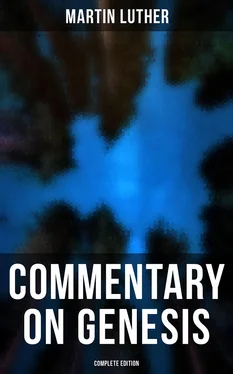Martin Luther - Commentary on Genesis (Complete Edition)
Здесь есть возможность читать онлайн «Martin Luther - Commentary on Genesis (Complete Edition)» — ознакомительный отрывок электронной книги совершенно бесплатно, а после прочтения отрывка купить полную версию. В некоторых случаях можно слушать аудио, скачать через торрент в формате fb2 и присутствует краткое содержание. Жанр: unrecognised, на английском языке. Описание произведения, (предисловие) а так же отзывы посетителей доступны на портале библиотеки ЛибКат.
- Название:Commentary on Genesis (Complete Edition)
- Автор:
- Жанр:
- Год:неизвестен
- ISBN:нет данных
- Рейтинг книги:4 / 5. Голосов: 1
-
Избранное:Добавить в избранное
- Отзывы:
-
Ваша оценка:
- 80
- 1
- 2
- 3
- 4
- 5
Commentary on Genesis (Complete Edition): краткое содержание, описание и аннотация
Предлагаем к чтению аннотацию, описание, краткое содержание или предисловие (зависит от того, что написал сам автор книги «Commentary on Genesis (Complete Edition)»). Если вы не нашли необходимую информацию о книге — напишите в комментариях, мы постараемся отыскать её.
Commentary on Genesis is the last work of Martin Luther, written during the last several years of his life. Luther's work follows the first volume of Psalms with critical and devotional remarks on the creation and on sin and the flood.
Commentary on Genesis (Complete Edition) — читать онлайн ознакомительный отрывок
Ниже представлен текст книги, разбитый по страницам. Система сохранения места последней прочитанной страницы, позволяет с удобством читать онлайн бесплатно книгу «Commentary on Genesis (Complete Edition)», без необходимости каждый раз заново искать на чём Вы остановились. Поставьте закладку, и сможете в любой момент перейти на страницу, на которой закончили чтение.
Интервал:
Закладка:
However I would prefer that their Christian labors and valuable time were spent on a better book and a better author. For I am not one of whom it can be said, "He did a good work"; neither one of whom you can say, "He tried to do a good work"; I belong to the last order of authors, who dare scarcely say, "I desired to do a good work." Oh, that I might be worthy of being the last in this last order. For all these lectures were delivered in an extemporaneous and popular form, just as the expressions came into my mouth, following in quick succession and also mixed with German, and surely more verbose than I wished.
Not however that I am conscious of having spoken anything contrary to the truth. My chief aim has been, as far as possible, to avoid obscurity and present as perspicuous as my talent and ability could the things which I wished to have understood. For I feel keenly that these weighty matters of which Moses wrote have been treated by me in a manner far beneath their dignity and importance. But I console myself with the old proverb, "Let him fail who attempts to do a thing better than he is able"; and with this Scripture, "God requires nothing of a man beyond the ability he has given him." 2 Cor. 8:12.
But why multiply words? That of which we treat are the Scriptures; the Scriptures, I say, of the Holy Spirit, and for these things, as St. Paul says, who is sufficient? 2 Cor. 3:5. They are a river, says Gregory, in which a lamb may walk or touch bottom and an elephant must swim. They are the wisdom of God which makes the wise of this world and "the prince" of it fools; which makes babes eloquent, and the eloquent men babes.
In a word he is not the best, who comprehends all things and never fails, for such a one never has been, is not now and never will be; but he is the best here who loves the most, as Ps. 1:2 says, "Blessed is the man that loveth the law of Jehovah and meditateth on it." Abundantly sufficient is it for us, if we delight in this divine wisdom, love it and meditate on it day and night.
We examine the commentaries of the fathers and find that the good will was certainly not lacking among them, but to do it they were not able. And how ridiculous are all of our day, who attempt to explain the great things, the Scriptures by a beautiful, as they term it, by a pure Latinity or by paraphrases, being themselves utterly destitute of the spirit and of understanding, and no more competent to treat such holy things than, as the proverb runs, "Asses are to play upon a harp." Jerome correctly said, Every one brings the offering to the tabernacle he can afford. One brings gold, another silver, another precious stones and the skins or the hair of goats. For the Lord has need of all these things. The wills of all were equally pleasing to him, though their offerings were not equal.
Therefore I permit these few goat hairs of mine to be published, as my offering and sacrifice unto God, whom I beseech in Christ Jesus, our Lord, that he would, through my labors, give occasion to others to do better or at least to exert themselves to explain these things better than I have done. As to my adversaries and their god, the devil, I believe with holy pride and exultation in the Lord, that I have given occasions enough to them to cavil and calumniate, for this I have continually and liberally done from the beginning of my ministry. This is the only service they are worthy to perform, for they neither can do nor desire to do anything that is good; being, as Paul says, "men of corrupt minds; and unto every good work reprobate," Tit. 1:15, 16.
May our Lord Jesus Christ perfect his work, which he hath begun in us and hasten that day of our redemption, for which we long with uplifted heads, and for which we sigh and wait in pure faith and a good conscience, in which we have also served an ungrateful world, a world that is the incorrigible enemy even of its own, to say nothing of our, salvation. "Come, Lord Jesus!" and let every one that loves thee, say, "Come, Lord Jesus!" Amen.
COMMENTARY ON GENESIS.
Chapter I.
Table of Contents
I. Introduction
Table of Contents
This first chapter of our Holy Bible is written in the simplest and plainest language, and yet it contains the greatest and at the same time the most difficult themes. Therefore the Jews, as Jerome testifies, were forbidden to read it or hear it read before they were thirty years of age. The Jews required that all the other Scriptures be well known by every one before they were permitted to approach this chapter. Their Rabbins however accomplished little good by this, for even many of the Rabbins themselves, whose years were more than twice thirty, give in their commentaries and Talmuds the most childish and foolish explanations of these, the greatest of all subjects.
Nor has any one yet in the church to the present day explained all these momentous things correctly and satisfactorily in every respect. For interpreters have confused and entangled every thing with such a variety, diversity and infinity of questions that it is very clear that God reserved to himself the majesty of this wisdom, and the correct understanding of this chapter, leaving to us only the general ideas that the world had a beginning and was created by God out of nothing. This general knowledge may clearly be taken from the text. But with respect to the particulars, there is so much that one cannot be clear about and hence innumerable questions have continually been raised in commentaries.
From Moses however we know that 6000 years ago the world did not exist. But of this no philosopher can in any way be persuaded; because, according to Aristotle the first and the last man cannot in any way be determined, although however Aristotle leaves the problem in doubt whether or not the world is eternal, yet he is inclined to the opinion that it is eternal. For human reason cannot ascend higher than to declare that the world is eternal, and an infinite generation preceded us and will follow us. Here human reason is forced to stand still. However from this belief follows as a consequence the perilous opinion that the soul is mortal, because philosophy knows no plurality of infinities. For it cannot be, but that human reason must be overwhelmed and shipwrecked in the sea of the majesty of these themes.
Plato collected, perhaps in Egypt, some traditional sparks as it were from the sermons of the fathers and prophets, and therefore he came nearer the truth than others. He holds that matter and mind are eternal; but he says that the world had a beginning and that it was made out of matter. But I cease to mention the opinions of philosophers, for Lyra cites these although he does not explain them.
Thus neither among the Hebrews, Greeks nor Latins is there a leading teacher whom we can follow here with safety. Therefore I shall be pardoned if I shall see what I can say on the subject. For except the one general opinion that the world was created out of nothing there is scarcely another thing connected with the subject on which there is entire agreement among all theologians.
Hilary and Augustine, two great lights in the church, believed that the world was made on a sudden and all at once, not successively during the space of six days. Augustine plays upon these six days in a marvelous manner in explaining them. He considers them to be mystical days of knowledge in the angels, and not natural days. Hence have arisen those continual discussions in the schools and in churches concerning the evening and morning knowledge, which Augustine was the cause of being introduced. These are all diligently collected and particularly mentioned by Lyra. Let those therefore who wish to know more about them consult Lyra.
But all these disputations, though subtle and clever, are not to the point in question. For what need is there to make a two-fold knowledge. Equally useless is it to consider Moses in the beginning of his history as speaking mystically or allegorically. For as he is not instructing us concerning allegorical creatures and an allegorical world, but concerning essential creatures and a world visible and apprehensive by the senses, he calls, as we say in our trite proverb, "a post, a post;" that is, when he says morning or day or evening, his meaning is the same as ours when we use those terms, without any allegory whatever. Thus the Evangelist Matthew, in his last chapter, uses the same manner of expression when he says that Christ arose on the evening of the Sabbath; that is, at that time of one of the Sabbath days which was formed by the evening light. But if we cannot fully comprehend the days here mentioned nor understand why God chose to use these intervals of time, let us rather confess our ignorance in the matter than wrest the words of Moses from the circumstances which he is recording to a meaning, which has nothing to do with those circumstances.
Читать дальшеИнтервал:
Закладка:
Похожие книги на «Commentary on Genesis (Complete Edition)»
Представляем Вашему вниманию похожие книги на «Commentary on Genesis (Complete Edition)» списком для выбора. Мы отобрали схожую по названию и смыслу литературу в надежде предоставить читателям больше вариантов отыскать новые, интересные, ещё непрочитанные произведения.
Обсуждение, отзывы о книге «Commentary on Genesis (Complete Edition)» и просто собственные мнения читателей. Оставьте ваши комментарии, напишите, что Вы думаете о произведении, его смысле или главных героях. Укажите что конкретно понравилось, а что нет, и почему Вы так считаете.












